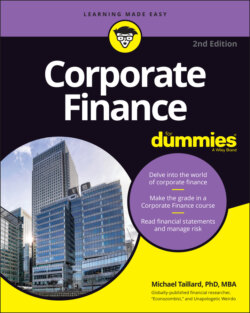Читать книгу Corporate Finance For Dummies - Michael Taillard - Страница 40
Regulatory bodies
ОглавлениеNumerous regulatory bodies oversee corporate finances and financial institutions, and each one warrants its own book (in fact, the role and regulations encompassing each regulatory body span volumes of books of information). I obviously can’t fit all that information in this book, so I just cover the basics of the main regulatory bodies here. Armed with their names and main purposes, you can do a quick online search to find out more about the ones that interest you most.
Securities and Exchange Commission (SEC): Sets the standards for corporate public financial reporting, the rules for investment, and the regulations for securities exchanges
Internal Revenue Service (IRS): Handles all tax reporting, tax accounting, tax collection, and pretty much all taxation issues other than determining the tax rates
Financial Industry Regulatory Authority (FINRA): A nongovernmental organization that’s in charge of setting and enforcing regulations among its member groups, which include brokerage firms and exchange markets
Commodity Futures Trading Commission (CFTC): The government body that regulates derivatives trading
Federal Deposit Insurance Corporation (FDIC): One of the few private corporations owned by the United States; sells insurance to depository institutions, ensuring that the deposits of each person be insured up to $250,000 in the event that something happened to the institution
Office of the Comptroller of Currency (OCC): Part of the U.S. Treasury; regulates all national commercial banks
National Credit Union Administration (NCUA): A government-backed organization that regulates credit unions
American Institute of Certified Public Accountants (AICPA): The professional organization that regulates all certified public accountants
Chartered Financial Analyst Institute (CFAI): The professional organization that regulates all chartered financial analysts
Financial Accounting Standards Board (FASB): A nonprofit organization that creates the generally accepted accounting principles (GAAP) that are used for all public accounting in the United States.
Government Accounting Standards Board (GASB): The non-profit organization that regulates the accounting of state and local governments
Federal Accounting Standards Advisory Board (FASAB): An advisory committee that regulates accounting standards for the U.S. federal government
Financial Accounting Foundation (FAF): The organization that provides oversight and regulation for other regulatory and professional bodies such as the AICPA, CFAI, and GASB
These are just U.S. regulatory bodies. Many more bodies provide oversight and regulation around the world. Plus, many nations are beginning to adopt international accounting standards (IAS), which may limit the need for individual national accounting standards; however, the standards boards will likely remain in most nations even after they adapt IAS. Looking at all the regulatory bodies that regulate other regulatory bodies, I believe that the industry as a whole may welcome some streamlining — not less regulation, necessarily (that’s a far more complicated debate), but less bureaucracy.
